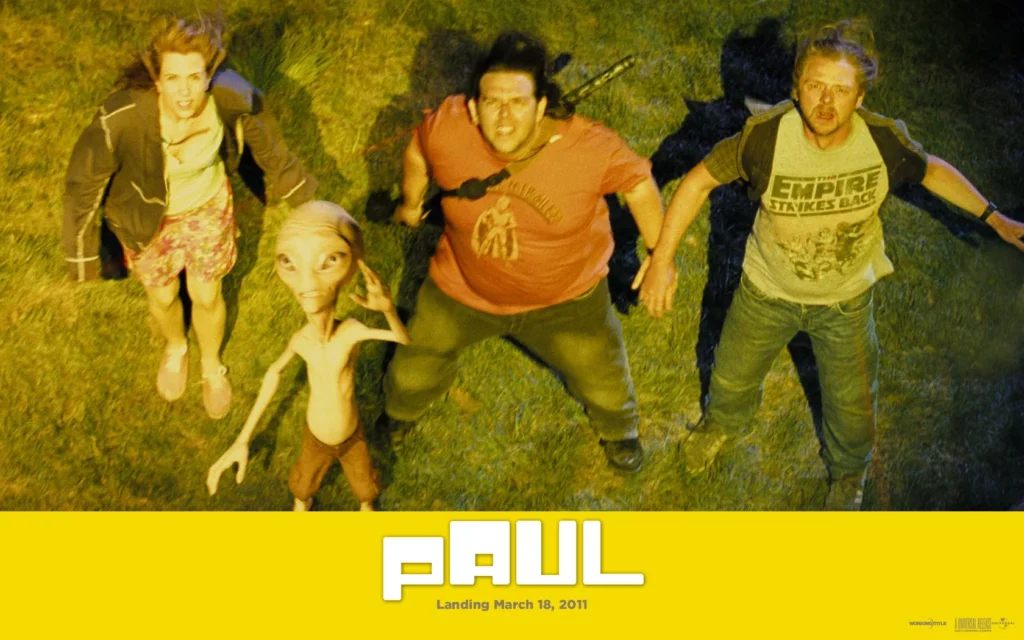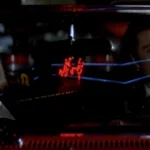In the realm of cinematic experiences, it’s rare to stumble upon a film that effortlessly marries two seemingly disparate genres. “Paul,” released in 2011, is one such gem that accomplishes this feat with flair. Directed by Greg Mottola and penned by the dynamic duo of Simon Pegg and Nick Frost, who also star in the film, “Paul” is a delightful concoction of science fiction and comedy. But what sets it apart from the run-of-the-mill sci-fi or comedy flicks? It’s the film’s unique ability to blend elements of extraterrestrial life, road trips, and laugh-out-loud humor into a cohesive, entertaining narrative.
The purpose of this article is to delve deep into the various facets that make “Paul” a standout film. We’ll explore its intriguing plot, compelling characters, the humor that tickles your funny bone while making you think, and the cultural references that add layers of richness to the story. So, whether you’re a sci-fi aficionado, a comedy lover, or someone who appreciates films that break the mold, read on to discover why “Paul” is a unique blend of sci-fi and comedy that you shouldn’t miss.
The Plot: A Journey Like No Other
“Paul” is not just another alien movie; it’s a road trip adventure with a twist. The story kicks off with two British comic book enthusiasts, Graeme Willy (Simon Pegg) and Clive Gollings (Nick Frost), who embark on a journey across the United States. Fresh from the excitement of the San Diego Comic-Con, they decide to visit famous UFO sites in their RV. Little do they know, their trip is about to take an unexpected turn.
Enter Paul, an alien voiced by Seth Rogen, who has been living in a top-secret military base for the last 60 years. Paul is not your typical Hollywood alien; there are no death rays or plans for world domination here. Instead, he’s an easy-going extraterrestrial who enjoys junk food and has a sense of humor. When Graeme and Clive encounter Paul, they find themselves in a dilemma: should they assist this friendly alien in his quest to return home, or should they play it safe?
The plot of “Paul” is a rollercoaster ride that takes our protagonists from Area 51 to the Little A’Le’Inn and beyond. Along the way, they encounter a host of colorful characters, including overzealous federal agents and a creationist who challenges their worldview. The film ingeniously weaves science fiction elements into the narrative, from UFO sightings to discussions about the existence of a higher power, making it a multi-layered story that appeals to both sci-fi buffs and those who are new to the genre.
The Characters: Not Just Your Typical Aliens and Nerds

One of the standout features of “Paul” is its cast of characters, each more memorable than the last. At the forefront are Graeme Willy and Clive Gollings, portrayed by Simon Pegg and Nick Frost, respectively. These two British geeks are the epitome of sci-fi fandom, but they’re far from one-dimensional. Graeme is the more adventurous of the two, while Clive is cautious but equally passionate about their shared interests. Their friendship and quirks make them relatable and endearing, serving as the emotional core of the movie.
Then there’s Paul, the alien who steals the show. Voiced by Seth Rogen, Paul is unlike any extraterrestrial you’ve seen in cinema. He’s sarcastic, witty, and has a penchant for pop culture—traits that make him more human than alien. His design, too, is a departure from the stereotypical green men; he’s more of a ‘gray’ with unique features that make him both adorable and intriguing. Paul’s character breaks the mold of what we expect from an alien in a sci-fi movie, making him a refreshing change.
The film also boasts a strong supporting cast, including Jason Bateman as the relentless Agent Zoil and Kristen Wiig as Ruth Buggs, a creationist who undergoes a transformation after meeting Paul. Each character, no matter how minor, adds depth to the story and contributes to the film’s unique blend of sci-fi and comedy.
The Humor: Where Sci-Fi Meets Comedy
What sets “Paul” apart from other films in the sci-fi genre is its unique brand of humor. The film doesn’t just rely on slapstick or one-liners; it incorporates a variety of comedic elements that complement its sci-fi narrative. From situational comedy arising out of Graeme and Clive’s fish-out-of-water experience in America to the dry British wit that they bring to the table, the humor is as diverse as it is entertaining.
But the real genius lies in how the humor is intertwined with the science fiction elements of the story. Take, for example, the scene where Paul explains his ability to turn invisible, a nod to typical alien superpowers, but with a hilarious catch—he has to hold his breath, making the power almost impractical. Or consider the moment when Paul heals a bird only to eat it immediately afterward, a funny yet poignant commentary on the circle of life.
The humor in “Paul” also serves a higher purpose; it often acts as a vehicle for social commentary. Whether it’s poking fun at creationism, government secrecy, or the stereotyping of both humans and aliens, the film uses comedy to shed light on broader issues, making you think even as you laugh.
In essence, the humor in “Paul” is not just for laughs; it adds depth to the characters, advances the plot, and even provides food for thought, making it an integral part of the film’s unique blend of sci-fi and comedy.
The Cultural References: A Nod to Sci-Fi Classics
One of the delightful aspects of “Paul” is its treasure trove of cultural references, especially nods to iconic science fiction films and series. These references are not just Easter eggs for keen-eyed viewers; they add a layer of richness and depth to the movie, making it a love letter to the genre.
From the outset, the film pays homage to sci-fi classics. The very setting of the San Diego Comic-Con, a mecca for all things geeky, sets the tone for what’s to come. As Graeme and Clive embark on their journey, they encounter scenarios reminiscent of famous scenes from movies like “Close Encounters of the Third Kind,” “E.T.,” and even “Star Wars.”
Paul himself is a walking, talking tribute to sci-fi culture. His name is a playful nod to the “Paul is dead” conspiracy theory about Paul McCartney, adding a layer of intrigue. His casual demeanor and appearance are a stark contrast to the often menacing or mysterious aliens in classic sci-fi, making him a subversion of the trope.
But it’s not just the big moments that carry these references; even the dialogue is peppered with subtle nods to the genre. Phrases like “This is a friendship, a ‘close encounter’ of the third kind,” or the use of the Vulcan salute from “Star Trek,” are cleverly integrated into the script, enriching the narrative and delighting fans of the genre.
The Impact: Reception and Legacy
“Paul” made quite a splash upon its release, both critically and commercially. With a budget of $40 million, the film managed to gross $98 million worldwide, proving that a sci-fi comedy could hold its own at the box office. Critics were generally favorable, praising the film’s unique blend of genres, witty script, and standout performances, particularly that of Seth Rogen as Paul.
But the film’s impact goes beyond numbers and reviews; it has carved a niche for itself in the realm of sci-fi comedies. Over the years, “Paul” has garnered a cult following, especially among fans of the genre and those who appreciate its clever humor and cultural references. It’s not uncommon to see Paul merchandise at comic book stores or to come across fan theories dissecting the film’s many layers.
Moreover, “Paul” has had a lasting impact on how sci-fi comedies are made. It showed that you could have a film that is both a laugh riot and a thoughtful exploration of sci-fi themes. It set a precedent for blending genres in a way that enriches the narrative rather than diluting it.
In a world where films are often pigeonholed into specific genres, “Paul” stands as a testament to the magic that can happen when you break the mold. It’s a film that has not only entertained but also made a lasting impression, proving that a unique blend of sci-fi and comedy is not just possible but also immensely enjoyable.

Conclusion
“Paul” is more than just a movie; it’s an experience that celebrates the limitless possibilities of storytelling when genres collide. With its unique blend of science fiction and comedy, the film offers something for everyone—whether you’re a die-hard sci-fi fan, a lover of comedy, or someone who simply enjoys a good story. From its compelling characters and multi-layered humor to its treasure trove of cultural references, “Paul” is a standout film that has left an indelible mark on the landscape of sci-fi comedies.
If you haven’t yet had the pleasure of watching “Paul,” now is the perfect time to dive into this one-of-a-kind cinematic journey. And if you’re already a fan, it’s a film that rewards multiple viewings, each time offering something new to discover. In a world filled with formulaic movies, “Paul” is a breath of fresh air, reminding us of the magic that happens when filmmakers dare to think outside the box.





